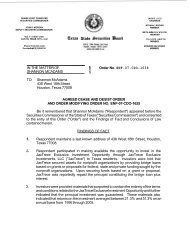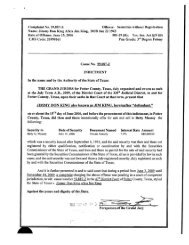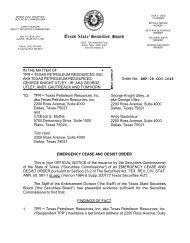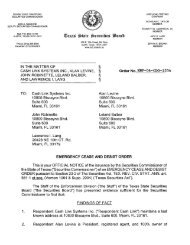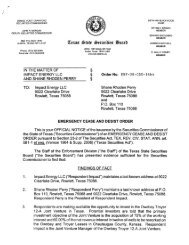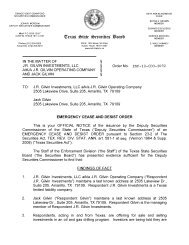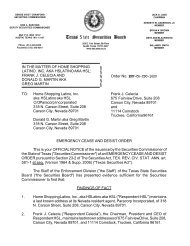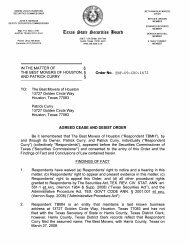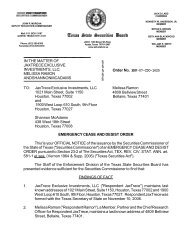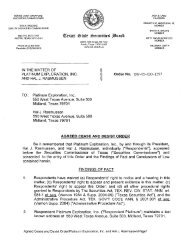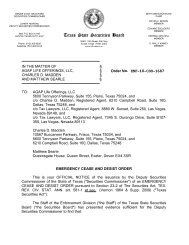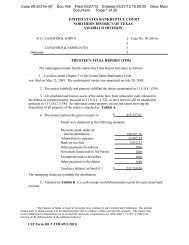Plaintiffs Fourth Amended Petition - Texas State Securities Board
Plaintiffs Fourth Amended Petition - Texas State Securities Board
Plaintiffs Fourth Amended Petition - Texas State Securities Board
You also want an ePaper? Increase the reach of your titles
YUMPU automatically turns print PDFs into web optimized ePapers that Google loves.
HCF DEFENDANTS’<br />
SALES OF ILLEGAL SECURITIES ISSUED BY<br />
DEFENDANT HILL COUNTRY FUNDING<br />
46. On February 7, 2008 and February 21, 2008, Defendant Gray formed Defendant Hill<br />
Country Funding-<strong>Texas</strong>, and Defendant Hill Country Funding-Nevada , respectively,<br />
and with the participation of Defendant Rogers, began issuing investments in Defendant<br />
Hill Country Funding’s own bonded life settlement contracts variously referred to as the<br />
“Re-Insured Re-Sale Insurance Policy” Program or the “Re-Sale Insurance Policy”<br />
Program (hereinafter referred to as the “HCF Bonded Program”). Investments in this<br />
program were purportedly secured by a mortality bond issued by various bonding<br />
companies, including Provident Capital Indemnity, Ltd. out of Costa Rica (“Provident<br />
Capital”), Internazionale SpA out of Genoa, Italy (“Internazionale”), Union Credit<br />
Finanziaria SpA out of Torino, Italy (“Union Credit”), and Condor Guaranty, Inc. out of<br />
Freeport, Grand Bahama, Bahamas (“Condor”).<br />
47. The basic structure of the HCF Bonded Program was to use investor funds to purchase resale<br />
life insurance policies by promising investors a guaranteed return payable from<br />
either the proceeds of the re-sale life insurance policies upon the death of the insureds or<br />
from the bond carrier. Basic components and representations of the HCF Bonded<br />
Program include:<br />
A. Investors were told their funds would be used to purchase re-sale life insurance<br />
policies and a mortality bond purportedly guaranteed investors’ return. Investors<br />
would become “irrevocable beneficiaries” on the insurance carrier’s permanent<br />
records.<br />
B. Once enough investor funds were received for a particular re-sale life insurance<br />
policy, Defendant Hill Country Funding would complete the purchase of the<br />
policy, change ownership of the policy to Defendant Hill Country Funding and<br />
assign irrevocable beneficiary interests to the investors and secured the mortality<br />
bond.<br />
C. The re-sale life insurance policies offered in the HCF Bonded Program were<br />
accompanied with life expectancies of the insureds which predicted the date the<br />
insureds would die and further set the date of maturity for the investment.<br />
D. Investors were told investments in the HCF Bonded Program were purportedly<br />
secured with a mortality bond issued by at least one of the aforementioned<br />
bonding companies that guaranteed the promised return to investors should the<br />
insured live past the stated life expectancy.<br />
E. Based on the purported mortality bond, Defendant Hill Country Funding told<br />
investors from the outset the lowest annualized yield for their participation.<br />
However, investors were further told that should the insured pass away before life<br />
expectancy, their net annualized yield would be higher.<br />
<strong>State</strong> of <strong>Texas</strong> v. Retirement Value, LLC, et al.<br />
Plaintiff’s <strong>Fourth</strong> <strong>Amended</strong> Verified <strong>Petition</strong> Page 12 of 57



